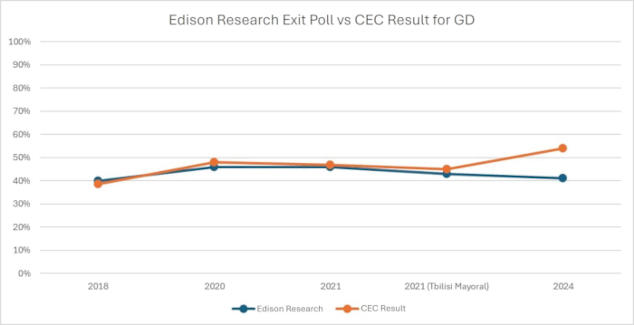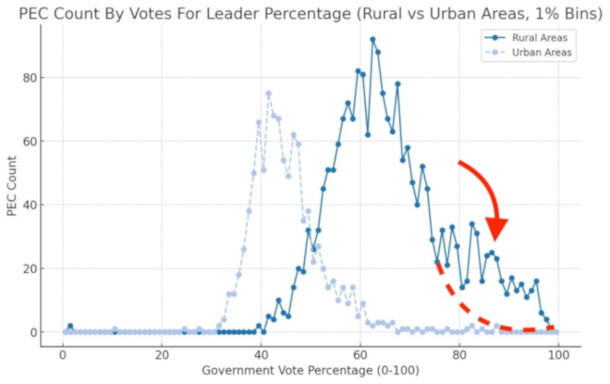How did Georgian Dream ‘win’ in Georgia?
SCRIPTS Blog Post No. 76 by Anastasia Mgaloblishvili
№ 76/2024 from Oct 31, 2024
Silence, confusion and devastation haunted the air in Tbilisi when the Central Election Commission announced a Georgian Dream victory in Georgia’s 2024 parliamentary elections. The 2024 elections were viewed by many as an existential battle for Georgia’s democracy – a referendum between moving towards Europe and falling back into Russian influence.
Georgian Dream leaders on stage, Tbilisi 2024.
Image Credit: Flickr / Jelger Groeneveld
With Georgian Dream leading by 53% of the vote, the results suggested that Georgia had chosen to move to the past. This was not only in stark contrast with the public opinion surveys in Georgia that consistently showed overwhelmingly high public support for democracy and EU integration, but it also greatly diverged with reliable exit poll data that revealed the opposition parties leading by around 12% in the polls.

The orange line represents election results published by Georgia’s Central Election Commission, while the blue line represents results published by the Edison Research center. Source: Sandro Sharashenidze.
While Georgian Dream is portraying the election results as a triumph of tradition, religion, and peace in Georgia, growing evidence and reports from the election period suggest that their victory largely stems from significant vote manipulation and electoral fraud in the country’s rural areas. Neither the United States nor the European Union have recognized the elections results thus far, and how the events will unfold depend very much on how successfully the President, civil society, and opposition are able to prove systemic nature of election fraud in the country.
Warmongering and instrumentalization of tradition
The sharp contrast in votes for Georgian Dream in urban vs rural areas suggests that the ruling party’s pre-election campaigns effectively won over more traditional segments of the Georgian society. Georgian Dream has lost in almost major cities of Georgia, but won by an overhwelming 70-80% in many rural areas according to the Central Election Commsion. While Georgian Dream’s election capaign was significant for these votes, it should not be overstated in explaining Georgian Dream’s success in rural areas.
Georgian Dream’s campaign capitalized on tradition, religion, and the promise of peace to pit Georgian voters against the opposition and the European Union. In an Orbán-like manner, Georgian Dream depicted the opposition as a threat to Georgia’s identity, religion, and traditions. More importantly, they claimed that the opposition, backed by the European Union and the United States, sought to open “a second front in Georgia” and “drag Georgia” into war. This rhetoric was echoed by Georgian Dream founder Bidzina Ivanishvili in his campaign appearances, where he spoke of a mysterious “global war party” which wanted to breed chaos and instability in the country. It was further amplified through banners comparing destroyed Ukrainian churches and schools to prosperous ones in Georgia, with signs reading “war” vs. “peace.” Given Georgian citizens' legitimate fears of war and high trust in the Orthodox Church, these strategies likely secured a substantial portion of Georgian Dream’s votes. However, attributing election outcomes solely to these strategies oversimplifies the bigger picture and plays into how Georgian Dream wants others to interpret the election results: as a victory of peace, traditional values, and religion over liberal democracy in Georgia. This interpretation also resonates with Viktor Orbán’s messaging, as he has framed Georgian Dream’s victory as a victory for illiberal, conserative forces. During his visit to Georgia two days after the contested elections, Orbán stated, “When conservative parties win, such disputes always follow. Such is European politics—if liberals win, they say it’s democratic, but if conservatives win, it’s not.” He went on to commend Georgia’s decision for : “peace,” adding, “Nobody wants their own country to be destroyed and involved in war. Therefore, we understand the Georgian people’s decision to choose in favor of freedom."
Vote-Buying and Intimidation
In reality, Georgian Dream’s high vote share in rural areas compared to its low share in most urban areas suggests that many of its votes came from individuals with limited freedom in choosing whom to support. Georgian Dream leveraged the dire economic hardship in these regions and citizens’ dependency on government benefits to bribe, intimidate, and pressure citizens both before and on election day. For instance, citizens were promised food, medicine, or subsidies in exchange for their votes, while others – especially public servants - faced threats of job loss if their votes did not favor the ruling party. The OSCE ODIHR, in its post-election briefing, expressed concerns about “cases of vote-buying, a widespread climate of pressure, and party-organized intimidation before and during the elections,” especially in rural Georgia. The Norwegian Helsinki Committee further confirmed that “in minority populated areas voters were systematically pressured at the polling stations,” concluding that the elections “failed to meet fundamental standards for free and fair elections.” OSCE ODIHR also stated that the “secrecy” of votes was frequently compromised on election day. Videos emerging from election day show that registrants could see who voters had chosen as the ballots appeared see-through. Civil society organizations have said this completely violates the principle of secrecy of votes and has called on the Central Election Commission to annul all precincts in which electronic systems that requires such ballots were used. Reports by civil society organizations also reveal that ID’s of undecided voters were taken away from citizens before election day and registered in the new electronic voting devices; on election day, government-affiliated individuals allegedly voted in the name of the people with stolen ID cards.
These instances of large-scale intimidation, vote-buying, and bribery indicate that while many citizens may have cast their votes for illiberal democracy, a significant number in rural areas did so out of fear, intimidation, and a dire need for food and medicine.
Ballot-Stuffing and Fraud
Recent analyses of vote share and turnout in rural areas, however, reveal that intimidation and vote-buying alone cannot explain the unprecedented scale of support for Georgian Dream in these regions. Unlike in previous elections, Georgian Dream secured around 70-80% of the votes in regions that had not been as politically active before. Research on the vote share and voter turnout in rural areas found that the distribution of votes for Georgian Dream did not follow the normal distribution of votes seen in democracies. Instead, an unusual spike—referred to as the “Russian spike”—characterized their vote share in these areas. In contrast, votes in urban precincts where Georgian Dream lost to the opposition were normally distributed. This suggests that ballots were stuffed or miscounted in favor of the ruling party in Georgia’s rural areas. Such practices are indicative of election fraud methods commonly seen in Russia, where election observers are often barred from polling stations. A video from Marneuli, for instance, captures a voter stuffing the ballot box with multiple ballots. Local election observers in Georgia have also revealed numerous cases of ballot-stuffing and other election rigging schemes. Electoral amendments made to the composition of the Central Election Commission, which equipped the institution with regime loyalists, further ensured that these violations could have happened with minimal resistance. In February, for example, the Parliament voted on an amendment granting the Speaker of Parliament, rather than the President, the power to nominate the Chairman and “non-partisan professionals” of the Central Election Commission.

Source: Levan Kvirkvelia
What’s Next for Georgia?
How events will unfold in Georgia will depend on how successfully the President, opposition, and civil society can prove that these violations had a systematic impact on the election results, both to Georgian citizens and international partners. The President has refused to recognize the legitimacy of the elections, and all opposition parties that crossed the threshold have declined to take their seats in parliament. Together with civil society organizations, they have been meeting and coordinating in recent days to uncover systematic schemes of election fraud. A massive rally held in Tbilisi two days after the elections indicates that tens of thousands of Georgians believe their votes were stolen. Assessments from Georgia’s international partners also tend to align with civil society and opposition views, suggesting that the elections were neither free nor fair. Neither the European Union nor the United States have recognized the legitimacy of the elections. Ursula von der Leyen said, for example, that Georgians fighting for democracy “have a right to know what happened,” stressing that “free and fair elections are at the core of European values. US President Joe Biden also stated that “independent international and domestic observers have not said” that Georgia’s elections “were free and fair” and called on the government to investigate all “election irregularities.” In response to growing concerns on the integrity of elections, the Central Election Commission has announced plans to recount ballots in one out of five randomly selected polling stations, representing approximately 14% of the total votes cast.
As of today, the opposition has demanded new snap elections to be administered by an international body. However, they are walking a slippery slope: many Georgians feel tired, hopeless and nihilistic, especially since they have witnessed endless cycle of protests yielding no results in the past before. Therefore, how effectively the opposition provides a viable action plan and convinces the public to fight for new elections will determine the level of pressure the West applies on Georgian Dream, and how much they will stand by the Georgian people.
Georgia’s battle for democracy is not yet over, but it is perhaps the most fragile and vulnerable it has ever been.
Anastasia Mgaloblishvili is a Doctoral Researcher at SCRIPTS and a Rethink.CEE fellow at the German Marshall Fund of the United States. Her thesis concerns internal contestations of the EU’s liberal script in Georgia.
